
- Afhalen na 1 uur in een winkel met voorraad
- Gratis thuislevering in België vanaf € 30
- Ruim aanbod met 7 miljoen producten
- Afhalen na 1 uur in een winkel met voorraad
- Gratis thuislevering in België vanaf € 30
- Ruim aanbod met 7 miljoen producten
Omschrijving
Many readers of René Guénon's later doctrinal works have longed to hear the tale of his earlier entanglement, and disentanglement, from the luxuriant undergrowth of so-called esoteric societies in late nineteenth-century Paris and elsewhere. Theosophy: History of a Pseudo-Religion documents in excoriating detail Guénon's findings on what did, and did not, lie behind the founding in 1875 of the Theosophical Society, which became a central force in the movement now known as the New Age and even now plays an important role in the global interfaith movement as well as among the global elites. Here Guénon shows how our popular ideas of karma and reincarnation owe more to Theosophy than to Hinduism or Buddhism, provides a clear picture of the charlatanry that was sometimes a part of the Society's modus operandi, and gives the early history of the Society's bid for political power, particularly its role as an agent of British imperialism in India. It is fitting that this work should finally appear in English just at this moment, when the influence of pseudo-esoteric spiritualities on global politics is probably greater than ever before in Western history. Much further information has of course come to light during the century since this book was first published, but it has never been superseded as a record of the path of a master metaphysician through this maze. A particularly unusual feature is its extensive treatment of the Hermetic Brotherhood of Luxor, which has recently attracted the attention of scholars of the occult.
Since the late nineteenth century, the Theosophical Society has been a central force in the movement now known as the New Age. Just as the Communist Party was considered 'old hat' by peace activists in the '60s, so the Theosophical Society was looked upon by many in the 'spiritual revolution' of those years as cranky, uninteresting, and passé. But the Society, like the Party, was always there, and-despite its relatively few members-always better organized than anybody else. Since then, the Society's influence has certainly not waned. It plays an important role in today's global interfaith movement, and, since the flowering of the New Age in the '70s, has established increasingly intimate ties with the global elites. And its various spinoffs, such as Elizabeth Clare Prophet's Summit Lighthouse, and Benjamin Crème's continuing attempt to lead a 'World Teacher Maitreya' onto the global stage-just as the Society tried to do in the last century with Krishnamurti-continue to send waves through the sea of 'alternative' spiritualities. Guénon shows how our popular ideas of karma and reincarnation actually owe more to Theosophy than to Hinduism or Buddhism, provides a clear picture of the charlatanry that was sometimes a part of the Society's modus operandi, and gives the early history of the Society's bid for political power, particularly its role as an agent of British imperialism in India. It is fitting that this work should finally appear in English just at this moment, when the influence of pseudo-esoteric spiritualities on global politics is probably greater than ever before in Western history.
Specificaties
Betrokkenen
- Auteur(s):
- Vertaler(s):
- Uitgeverij:
Inhoud
- Aantal bladzijden:
- 352
- Taal:
- Engels
- Reeks:
Eigenschappen
- Productcode (EAN):
- 9780900588808
- Verschijningsdatum:
- 23/05/2004
- Uitvoering:
- Hardcover
- Formaat:
- Ongenaaid / garenloos gebonden
- Afmetingen:
- 152 mm x 229 mm
- Gewicht:
- 639 g

Alleen bij Standaard Boekhandel
Beoordelingen
We publiceren alleen reviews die voldoen aan de voorwaarden voor reviews. Bekijk onze voorwaarden voor reviews.







